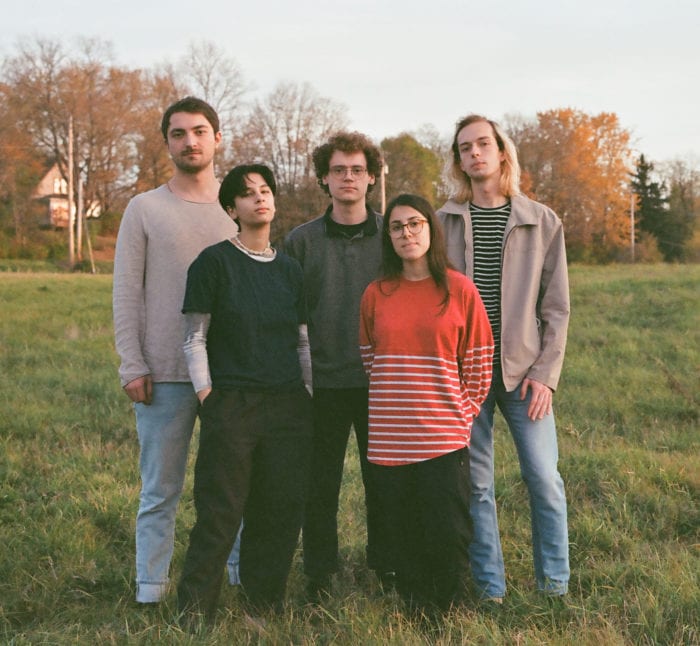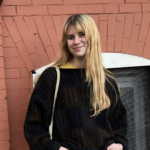
On recording remotely during a pandemic and rocking even harder.
It was only a few months after Boston-based band Raavi & the Houseplants released their first full-length album, Don’t Hit Me Up, that the pandemic put everything on pause. The band members, mostly students at Berklee, found themselves scattered when school went online. However, with frequent Discord meetings and devoted planning, they found ways to push forward.
On Feb 14, Raavi & The Houseplants will release “Major Tool,” their second single recorded since the start of the pandemic. Accompanied by a video, the song’s lyrics describe a moment of insecurity and vulnerability in a relationship, marking the band’s shift away from their mellow indie sound in favor of a faster, heavier beat.
I spoke with lead guitarist and vocalist Raavi Sita, drummer Madden Klass, bassist James Duncan, and third guitarist and producer Justin Termotto about their experience recording remotely for the first time, the new single as a turning point, and rocking harder in quarantine.
Tell me about the new song.
Justin: I think there are a couple of songs that Raavi has written that have changed the course of where our sound is going and kind of defined what we’re trying to do. For Don’t Hit Me Up, it was the song “Don’t Hit Me Up.” We latched onto that vibe and kind of made the album around it. I feel like “Major Tool” is that same thing, but for what we’re doing next. It’s a point that marks a change of trajectory.
Raavi: I think “Major Tool” is also thematically a little more mature than a lot of the songs from the record. I was a teenager when I wrote every song on Don’t Hit Me Up, so even though I was being very honest with how I was feeling, one of the big themes was that I just was misunderstanding people and miscommunicating with people, and thus I didn’t get what was happening in my life and with my relationships and stuff.
“Major Tool” is about moving past that and forcing yourself to have uncomfortable conversations with people for the purpose of maintaining a healthy relationship and avoiding everything I was singing about on the record.
How has your sound changed since Don’t Hit Me Up?
Raavi: I play with a pick now. I’ve never played with a pick my entire life. For the longest time, I was like, I’ll just never play with a pick, because if you’re playing fingerstyle you basically have five picks. But it really does give you a different attack on the strings. The sound is super, super different.
James: Yeah, we rock harder now.
Justin: We definitely do rock harder now.
Do you feel as if there’s any way in which “Major Tool” and “Sticky,” the band’s other single since the pandemic started, speak to each other?
Madden: They were both recorded remotely. For the first time, we did it all separately. So they definitely have a similar sound. We all did it from our homes.
Raavi: I wrote “Major Tool” right after we started recording our album, and “Sticky” the night our album dropped, so they were written pretty far apart from each other. But because we recorded them so differently than we’ve recorded the rest of our stuff, we made production choices to kind of make them feel like they belong together.
Justin: Yeah, they’re a bit more guitar-focused than our previous stuff, because we added a third guitarist.
James: Also, we’ve been playing more with using synthesizers and percussion and stuff to kind of create a more cohesive sound.
Raavi: It’s interesting because we’ve never played “Sticky” live in the way that it’s recorded. So when we transition into playing live shows again, “Sticky” is gonna be so fucking hard. It’s the hardest guitar part I’ve ever written. And it’s cool because the limitations we had made it so that we could really focus on that because, you know, you can cheat when you’re recording. We’re never gonna play it as well as the recording made it sound.
Justin: Also, these were the first songs I had produced fully on my own for Houseplants. “Major Tool” was definitely a bit easier to put together, just because we did it after “Sticky,” so I had a better idea of how the process would go. Also, we had been playing it as an encore for every show I had played with the band.
Madden: And we played a lot of shows in the beginning of 2020. So we kind of had that one down. We knew what the vibe was, we knew what it wanted to sound like on a record, so it was easier to execute.
How else has the pandemic affected you as a band?
Raavi: We communicate a lot more now. The majority of when we would hang out—other than just one on one hangs, because we’re friends and stuff—we would mostly just talk at rehearsal, and then we’d go to the gig. So now that we have a specific time we can put aside to talk about band stuff, not just five minutes we squeeze in at the end of a rehearsal, we’re doing a better job communicating, which is very, very important. Because there’s not much else we can do other than plan, right?
James: It’s made it easier to think in a bigger picture way, rather than just getting ready for our next gig. At the same time, the only reason we were all living in the same city in the first place was because of college. And since college is not that much of a thing these days, that has led us to geographically get a bit scattered, which makes it a lot harder to actually create.
Madden: Yeah, we planned a week together in November, and that took a lot of thinking ahead, getting tested, making sure that it worked for everybody. And money.
Raavi: Also, personally, it’s hard to write in a pandemic. If I’m not going out and seeing other musicians play live, I just don’t feel very motivated to work on my craft.
Madden: I think we’re having a more difficult time putting songs together, too.
Raavi: We used to find out what worked through the gigs we would play. We would be like, “Okay, so we played this the other day, and this part was kind of lame, so how can we fix it?” But now, we don’t have all those shows to practice these songs at.
Madden: Yeah. And there was a lot of collaboration at that time, because we had a lot of rotating members—people who couldn’t make it to a show, fill-ins—and we drew a lot of inspiration from those people.
Raavi: It’s one of my favorite aspects about this band, that we have all these secondary members.
Madden: The big family. I’ve always wanted to draw a Family Houseplant.
James: Houseplants Family Tree, let’s go.
You’re releasing a music video with the single. What were your thought processes and goals in making it? What’s the voice recording at the end?
Raavi: So, my mom is a teacher. In the beginning of quarantine, she organized a video for her students at the school and all the teachers to film themselves sending positive messages to the kids and being like, “We miss you; we’ll see you soon.” All that stuff. And that was just the video that we recorded. And then we had my tenants’ little babies in it as well. So that’s why we’re hearing a little kid saying, “Bye!” at the end. I sent it to Justin like, “Can we put this at the end of the song?” because it was cute.
Justin: And it was just very fitting for how we were all feeling toward the beginning of quarantine.
Raavi: There’s not a narrative to the video. We were just like, “What can we do with the time that we have?” Because we were trying to fit in so much that week. We were trying to fit in recording live sessions, and songwriting, and filming a music video, and doing photoshoots, because we hadn’t seen each other. We had to make up for seven months of lost content.
James: It was pretty improvised. Just drive around, stop when we see some tight shit, and get out and film ourselves in front of it.
Justin: We’re all just a bunch of fidgety weirdos.
James: I couldn’t see it with any other vibe, though, honestly, after watching the finished video.
What’s next?
Raavi: We’re currently writing what is probably going to be an EP. We’re going to do another retreat soon, so we can finish writing it together. We also just re-recorded one of our older songs, and we’re putting the new version of it out soon.
Madden: It’s one of our favorites to play live, so we wanted to give it another go.
Raavi: Yeah, and it’s called “All Over Again,” so it’s like…
Madden: Oh, geez. “All Over Again” squared. “All Over Again, All Over Again.”
James: “All All Over Again Again.”
Raavi: But it was really fun, because I felt like we were finally doing that song justice.
Madden: And I think our sound is gonna be pretty cohesive going forward, stemming off of “Major Tool.” It’s getting heavier.
James: It’s funny how we stop playing shows, and then we start going harder on these songs. It’s almost like we’re overcompensating.
Raavi: I think it’s cool because a lot of bands’ second bigger release ends up getting a little tamer. I don’t know many bands that go in the other direction.
Marie Ungar is a writer, editor, and student living in Greater Boston. You can read more of her work in the Harvard Crimson and Charlottesville Tomorrow. She’s currently studying English at Harvard University, where she’s the poetry editor of the Harvard Advocate.

